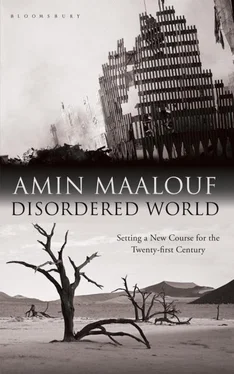However, at one point in their discussion, the first scientist might say to the other: ‘Let’s forget our past quarrels and simply ask ourselves: isn’t our planet much healthier as a result of the course of treatment it followed? I will continue to maintain that it was in mortal danger and you will continue to doubt it, but weren’t our countries right to reduce their consumption of fossil fuels and their pollution from factories and power stations?’
And that is the basis of the wager I have formulated about climate change: if we proved incapable of altering our behaviour and the threat turned out to be real, we would have lost everything. If we did manage to change our behaviour radically, and the threat turned out to be illusory, we would not have lost anything at all. Because the measures which would allow us to face the threat of climate change are in reality, when you think about it, measures which are worth taking in any case — in order to reduce pollution and its harmful effects for public health; in order to reduce the threat of poverty and social upheavals which climate change could provoke; in order to avoid savage conflicts for control of oil fields, mining regions and water supplies; and in order for humanity to progress in greater serenity.
Consequently, it is not up to the majority of scientists to show that the threat is real. It is, rather, up to the dissenting minority to show irrefutably that the danger is completely illusory. The burden of proof is reversed, as a lawyer might put it. It is only if we are absolutely sure that this mortal danger does not exist that we would have the moral right to drop our guard and continue on our way without changing any of our habits.
Of course, such certainty is out of the question. The stakes are so high that no one — no researcher, industrialist, economist, political leader, intellectual, no sensible being — could take the responsibility for asserting, against the view of the vast majority of scientists, that risks linked to climate change do not exist and that we should simply ignore them.
In this field more than the others, all we can do is anxiously wonder which path humanity will take — that of a step change or that of business as usual.
The times we are living in give contradictory signs. On the one hand, our awareness is real and the weight of the US, which too long pushed down on the wrong side of the scales, should now tip the balance in the opposite direction. However, the hoped-for step change requires a level of solidarity and even a profound bond between nations which is not easy to achieve. And it demands sacrifices.
Are the countries of the North prepared to disrupt their way of life? Are emerging nations, especially China and India, ready to put at risk their economic take-off, the first chance they have had in centuries to escape underdevelopment? That supposes at the very least vast concerted global action, from which everyone gets something and no one feels hard done by.
I want to believe that such an effort is possible, but I cannot easily overcome my worries when I look at our world: a world characterised by profound asymmetry in international relations; a world in the grip of identity-based tribalism and supreme selfishness, in which moral credibility remains a rare commodity; a world in which great crises generally push nations, social groups, companies and individuals to protect their own interests fiercely rather than demonstrate solidarity or generosity.
What we see unfolding at the start of this century is no ordinary kind of turbulence. For the globalised world born out of the ruins of the Cold War, it may be that this turbulence will shake us out of a too lengthy prehistory both morally and intellectually, and help found a new world. But equally, it may turn out to cause destruction and disintegration and be the prelude to painful decline.
Will a way be found for the world’s populations — which evolution has forced into permanent contact with each other despite all their differences of religion, colour, language, history and traditions — to coexist in peace and harmony? The question is a real one in every country and every city, as well as on a global level. And at present, the reply remains uncertain. Whether we think of countries where different communities have coexisted for centuries, or those which have accepted significant numbers of immigrants within recent decades, it is clear that mistrust and incomprehension are growing to the point where all integration policies are compromised, as is simple coexistence. Many elections and debates today are weighed down by this thorny issue, which encourages identity tensions and xenophobia, especially in Europe, where some of the most tolerant societies have become irritated, embittered and entrenched over it. But at the same time, we have seen surprising reversals in the perception of the Other, stemming from less visible developments in people’s attitudes, the most revealing and spectacular example being the advent of Barack Obama.
The global debate on coexistence is not going to go away. Violent or muted, explicit or implicit, it will remain with us throughout this century and for centuries to come. Our planet is a closely woven web of different populations, all of which are conscious of their identity and of the regard in which they are held by others; they are also aware of the rights they want to win or hold on to, and believe that they both need others and need to protect themselves from them. There is no point in waiting for the tensions between them to lose their edge simply with the passage of time. There are, after all, peoples who have lived side by side for centuries without ever achieving mutual respect or peaceful coexistence. Overcoming prejudices and hatred is not innate to human nature. Acceptance of others is no more or less natural than rejection. Reconciliation, uniting, adopting, taming and pacifying are acts of will, acts of civilisation which demand lucidity and perseverance; acts which need to be acquired, taught and cultivated. Teaching people to live together is a long struggle which is never completely won. It requires calm reflection, skilful teaching, appropriate legislation and effective institutions. Living in the Levant before emigrating to Europe, I often had occasion to observe the difference it made to a society when such a battle was fought with determination and subtlety as opposed to being neglected, or clumsily and incoherently executed.
Today that battle needs to be waged on a global scale for the whole of humanity, and also within each population. Clearly that is not yet happening, at least not enough. We talk constantly of the global village, and it is true that thanks to progress in communications, our planet has become a single economic space, as well as a single political and media space. But that makes mutual hatreds all the more apparent.
In particular, the rift between the West and the Arab-Muslim world has continued to grow in recent years, to the point where it now seems almost beyond repair. I am one of those who feel sorrow at this every day, but there are many who have got used to it and some who even relish it, ignoring the huge potential for violence that this clash may harbour, which casts a dark shadow over our common future. The deadly terrorist attacks which have blighted the past few years are examples of this potential. Those of 11 September 2001 have already entered our new century’s history as a monstrous atrocity. Acts similarly inspired have taken place on every continent, from Nairobi to Madrid, Bali to London, via Djerba, Algiers, Casablanca, Beirut, Amman, Taba, Jerusalem, Istanbul, Beslan or Mumbai, not to mention Baghdad.
It is true that such attacks, however violent they may be, do not threaten to annihilate the world as the Soviet and American thermonuclear arsenals did during the Cold War. They could nonetheless turn out to be extremely deadly, especially if in the future they involve so-called non-conventional weapons — chemical, biological, atomic or something else. Moreover the resultant social, political and economic disruption they could cause would be devastating.
Читать дальше












